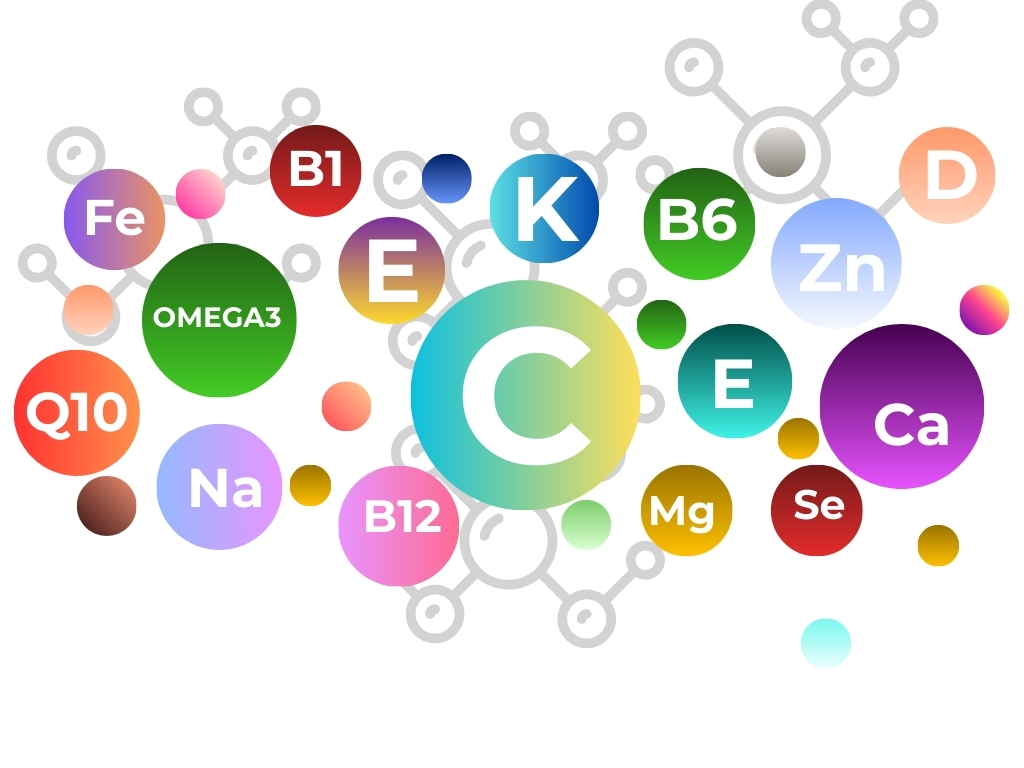They’re bright, colourful, and they’ve been a staple in UK households for decades. Multivitamins promise a simple way to “cover all your bases” with just one pill a day. But now that we live in a more ephemeral world where wellness trends come and go – and diets are more varied than ever, do multivitamins actually live up to the hype?
It’s an appealing idea. It seems like in a single step, you could tick off a whole list of vitamins and minerals at once. And with most people having busy lives and jobs where meals are often rushed and diets can feel less than perfect, that reassurance carries weight.
At The Health Suite Leicester, we explore the science, the myths, and the practical reality of taking multivitamins – so you can make a more informed decision for your health.
Where Multivitamins Came From
Originally, they were developed to prevent widespread nutrient deficiencies in populations with limited access to diverse foods – they were a lifesaver.
These supplements were particularly important in regions where fresh produce was scarce, winters were long, and the variety of available foods was restricted. In these circumstances, a single tablet could mean the difference between health and serious illness.
But when you fast forward to the present day, most of us have access to a wide variety of fresh foods year-round. And yet, despite this, multivitamins remain popular – often marketed as an “insurance policy” against the stress of modern life.

Who Benefits Most from Multivitamins?
They’re not essential for everyone, but certain groups of people might see the most tangible benefits:
- Those who are pregnant or breastfeeding – Folic acid, iron, vitamin D, and other nutrients are critical for both mother and baby, so supplementation is often recommended during pregnancy and while breastfeeding. Sometimes pregnancy places higher demands on the mother’s body than diet alone can meet, increasing the risk of nutrient deficiencies. This is why many women are advised to take a tailored prenatal or postnatal supplement to support their own health as well as the healthy growth and development of their baby.
- People following dietary restrictions: Vegetarians, vegans, and those with food intolerances can sometimes miss out on key nutrients such as vitamin B12, iron, or calcium, all of which are vital for energy, bone strength, and overall health.
- Older adults: As we age, the body naturally absorbs less vitamin B12, vitamin D, and calcium, increasing the risk of deficiencies that may affect energy, mood, and bone density.
- Those recovering from illness, surgery, or injury: During recovery, your body’s nutrient demands are higher, and supplementation can help bridge temporary gaps to support healing and immune function.
And What About Everyone Else?
Even if you don’t fit into one of the groups above, a daily multivitamin can still act as a useful nutritional “safety net.” Life isn’t always predictable — busy schedules, skipped meals, or grabbing food on the go can all make it harder to get the full range of nutrients your body needs. Taking a balanced supplement can help cover those gaps and give you peace of mind that you’re not falling short on the essentials.
Food First:
At The Health Suite in Leicester, what we usually promote is a food-first approach, which means eating a diet with as many whole foods as possible before turning to supplementation. This provides not just vitamins but also fibre, antioxidants, and other cofactors that work synergistically, which supplements have little to none of. When vitamins come from food, they are more easily absorbed and function better within the complex nutritional network present in real meals.
Eating a balanced diet covers most nutrient needs, which means your multivitamins are a nice-to-have rather than a necessity.
Can You Overdo It?
Whilst they’re generally safe to take, excessive intake can be counterproductive at best, and dangerous at worst:
- Fat-soluble vitamins (meaning they dissolve in fats) like A, D, E and K usually accumulate in the body, and they can become toxic when the dose is too high.
- Water-soluble vitamins like C or B6 can irritate your digestive system when taken in large quantities.
- When you rely solely on a pill, it can give you a false sense of security, which can, in turn, make you neglect your diet.
That’s why a balanced diet, rich in colourful fruits, vegetables, lean proteins, and whole grains, remains the cornerstone of good health. Supplements can play a role, but they should not and cannot replace the foundation that real food provides.
Multivitamins may be harmful in some cases
Dosage is an essential factor to consider when taking multivitamins. Although high doses of some vitamins and minerals are acceptable for some people, high amounts can be harmful.
The appropriate dosage can depend on a vitamin’s solubility, which is categorised into the following two groups:
- Water-soluble. Your body flushes out excess amounts of these vitamins through your urine.
- Fat-soluble. Since your body has no easy way to get rid of these, excess amounts may accumulate in your liver.
Best Way to Take Multivitamins
There are actually different things you can tweak to elevate their benefits.
- Make sure you pick one that’s suited to things like your age, sex, and lifestyle. Different products have different formulas, and they’re often targeted to different age/sex groups.
- They should be taken with food because it helps with absorption, especially for fat-soluble vitamins.
- It’s about lifestyle too, so make sure to exercise, manage your stress better and stay hydrated.
Don’t take a megadose unless your doctor or other health professional instructs you to do so. - Your energy levels, sleep quality, and overall vitality can indicate whether your approach is working so pay attention to how you feel.
How We Support Your Nutrition at The Health Suite Leicester
At The Health Suite Leicester, we take a functional medicine approach — looking beyond symptoms to understand the deeper drivers of health. Your genetics, metabolism, and lifestyle all influence how your body processes nutrients, and that’s why we use the latest testing to remove the guesswork.
- Comprehensive Blood Testing & Functional Testing
We use advanced blood panels to measure vitamins, minerals, hormones, and inflammation markers, alongside gut and stress testing. These tests highlight hidden imbalances before they become health concerns. - Lifecode Gx® Nutrigenomics Testing
Your genes play a powerful role in how your body absorbs and uses nutrients. Our Lifecode Gx DNA tests allow us to understand your unique genetic blueprint and how it influences areas like detoxification, methylation, energy, hormones, and brain chemistry. With this insight, we can recommend a truly personalised nutrition and supplement plan that works with your biology — not against it. - Individualised Nutrition & Supplement Plans
Using your test results, we build tailored plans with the right nutrients in the right forms and doses for your body. No generic multivitamins, just targeted support. - Functional Medicine Guidance
Nutrition is just one piece of the puzzle. We also look at lifestyle factors such as sleep, stress, digestion, and exercise to create a holistic wellness plan that lasts. - Advanced Nutrient & Recovery Therapies
To complement your nutrition strategy, we offer treatments such as IV nutrient therapy, red light therapy, hyperbaric oxygen therapy, and powerplate technology— all designed to boost recovery, immunity, and overall vitality.
At The Health Suite, this is precision wellness: science-driven, personalised, and designed to help you feel and perform at your best.
Other Ways to Support Your Nutritional Health
At The Health Suite Leicester, nutrition isn’t just about food and supplements — we combine it with therapies that enhance absorption, support recovery, and improve overall wellbeing. These treatments work alongside your personalised nutrition plan to help you get the most from your health journey:
- IV Nutrient Therapy – By delivering vitamins and minerals directly into the bloodstream, IV therapy bypasses the digestive system for faster, more effective results. It’s especially useful for boosting energy, immunity, and recovery. [Learn More: IV Nutrient Therapy]
- Lymphatic Drainage Massage – Gentle, targeted massage techniques encourage circulation, reduce water retention, and support the body’s natural detoxification pathways. [Learn More: Lymphatic Drainage Massage]
- Red Light Therapy – Safe, non-invasive light wavelengths stimulate cellular repair, improve skin health, and may even support energy production at a mitochondrial level. [Learn More: Red Light Therapy (PBM)]
- Personalised Nutrition & Diet Plans – Built around your lab and blood test results, lifestyle, and health goals, these plans remove the guesswork and ensure your body gets exactly what it needs. [Learn More: Nutritional Therapy]
The Bottom Line
For some people, adding a daily multivitamin can make a noticeable difference to their health, energy, and overall well-being. But it’s not accurate to say that everyone needs them in the same way. True, lasting wellness comes from understanding your own body’s unique requirements — through testing, personalised guidance, and lifestyle choices — and then responding with the right nutrition and support.
Here at The Health Suite Leicester, we help you take the guesswork out of nutrition – providing you with personalised guidance, the most advanced tests and therapies, and a clear path to feeling your best every day.
Take Control of Your Health
If you’re looking to feel your best and improve your wellness, book a consultation with us here at The Health Suite Leicester.
We’ll explore your nutrition, supplementation, and wellness strategies that work for you so you can stop guessing what your body needs – and start acting with accuracy and confidence.
Get the nutrients your body actually needs — see how Nutritional Therapy can help.
